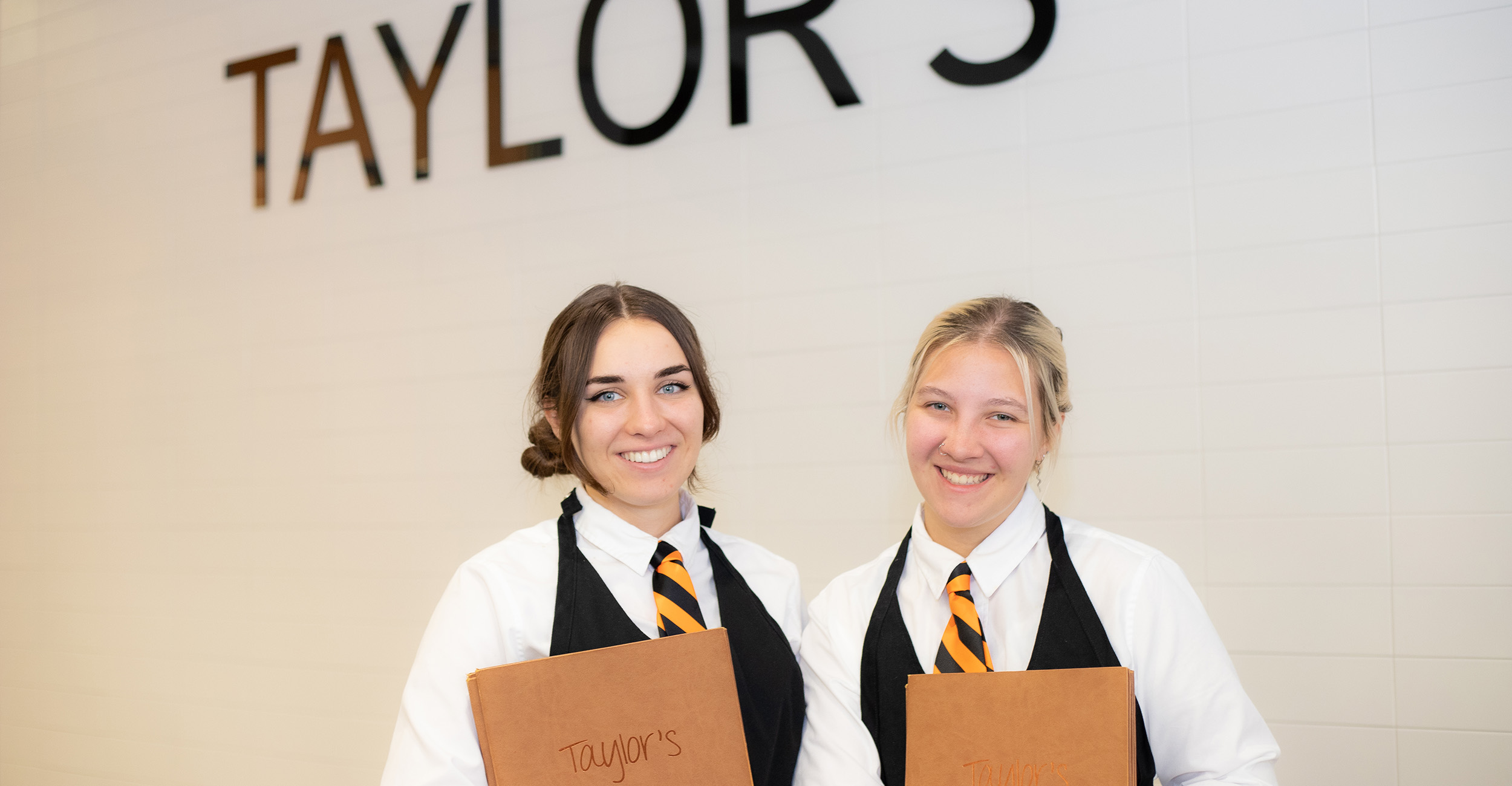
OSU's School of Hospitality and Tourism Management and OSUIT's Culinary Arts Program prepare future restaurateurs
Thursday, April 27, 2023
Media Contact: Mack Burke | Associate Director of Media Relations | 405-744-5540 | editor@okstate.edu
For three hours a day, four days a week, anyone on the Oklahoma State University campus can be transported to a different part of the world.
At Taylor’s Restaurant in the Nancy Randolph Davis Building, a hustle and bustle of professionally dressed students run the business — from the kitchen all the way to the host stand.
It’s a restaurant on the surface, serving different international cuisines each week, but it’s also a business. And at the heart of it is a business class — restaurant operations — one that every student in the School of Hospitality and Tourism Management (HTM) is required to take because food will be involved anywhere an HTM grad goes to work in their field.
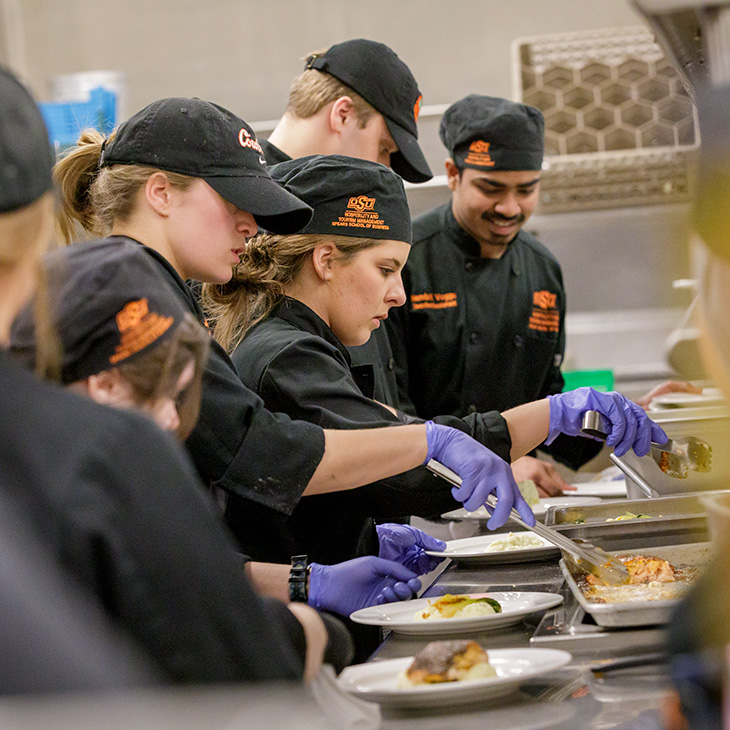
The learning lab is part of the unique curriculum HTM students experience in their time in Stillwater. The school not only teaches the next generation of hotel and restaurant managers, but also managerial roles in other industry segments such as resorts, clubs, events, beverage, casino and gaming, theme parks, cruise ships, and property and real estate management. Anything involving people paying for a service falls under hospitality and therefore, HTM.
“In order to be a manager, you have to walk in the shoes of frontline employees,” said Dr. Brij Thapa, professor and head of HTM. “So, we require every single student to do three or four food related courses. Regardless of the interest in hotels or theme parks, you’ve got to understand the food service business because food is a common denominator in everything that defines hospitality. It’s the great equalizer. Food is really the window to the soul of a culture.”
HTM is one of the oldest programs at OSU, dating back to 1937 as the School of Hotel and Restaurant Administration (HRAD). For 82 years, HRAD was a campus institution but bounced around from college to college. In 2019, it found its current home in the Spears School of Business and renamed itself to HTM to reflect its core identity as a business program. It has now been reimagined to focus on the business of hospitality and tourism.
Thapa arrived in 2020, just as the COVID-19 pandemic was hitting the HTM industry hard. It has since bounced back, but being prepared for the worst is among the reasons students in the program are taught finance, accounting, entrepreneurship, analytics — everything it takes to run a business. The degree program has evolved and is now a Bachelor of Science in business administration, hospitality and tourism management.
“Our students have the skill sets to really work in any sector that deals with people,” Thapa said. “Our focus is on learning by doing and is triangulated with content-based lectures, experiential learning through our signature events, and an immersive experience with a mandatory internship. Also, students are involved in actually operating a business via our labs — Taylor’s Restaurant, Planet Orange Cafe and Planet Orange Express. Students are equipped with a myriad of skills and are ready to take on the challenge upon graduation.”
THE BUSINESS
James Leewright is a shining example of HTM graduates’ versatility.
Although he is now president and CEO of the Oklahoma Restaurant Association (ORA), most of Leewright’s career has been spent in areas outside the realm of hospitality and tourism.
“There is much more to having a successful restaurant than a great family recipe.”
A 1994 HRAD graduate of OSU, he initially stayed in that field as he managed a private club throughout college. He went on to become a general manager at a Whataburger and eventually was the director of food and special events for his hometown Tulsa Zoo.
Leewright had a career change at his next stop, though, working in energy for Williams Companies, a Fortune 500 natural gas corporation. He then ran a restoration and construction company before setting his sights on politics. He started in the Oklahoma House of Representatives in 2014 but quickly moved over to the Senate two years later.
Leewright credits the versatility from the curriculum with helping him in all his endeavors — from the kitchen to the campaign trail.
“Strong skill sets like ‘thinking quickly on your feet’ and understanding logistics from procurement, inventory controls, production and ultimately to delivery of a product that I obtained from my HRAD degree, served me well,” Leewright said.
He was the only freshman senator of his class to lead a standing committee, which was on Business, Commerce and Tourism, an area Leewright was strongly familiar with. After a decade in the Legislature, he gave up his seat and used the knowledge he had from running that committee to lead the ORA.
In his current role, Leewright oversees an industry that ranks third in terms of total economic impact for the state. Tourism brings in $10.1 billion to Oklahoma annually, he said, with the restaurant industry making up a large portion. That figure outpaces numbers from neighboring Arkansas and Kansas.
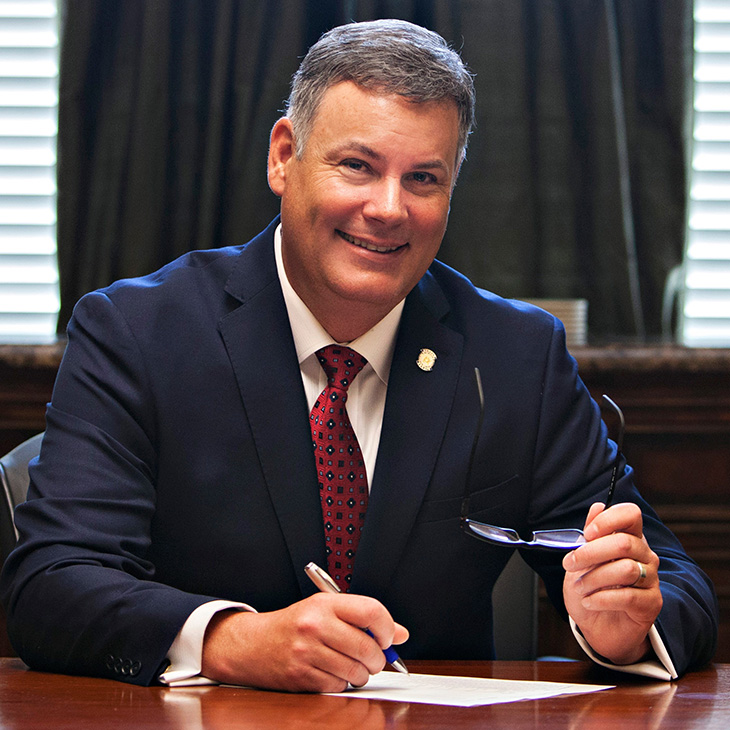
Although it is a fruitful industry, it is tough to make it, with nearly half of restaurants failing in the first two years. Leewright said with schools like HTM and the Culinary Arts program at the OSU Institute of Technology, graduates have a leg up on operating a successful venture.
“There is much more to having a successful restaurant than a great family recipe,” he said. “Understanding logistics, financing, labor scheduling, inventory controls, food safety, restaurant layout, etc. are essential for the prosperity of a restaurant.”
Mike Rogers understands the trial of maintaining a successful restaurant business. The 1977 HTM graduate is now the vice president of Hal Smith Restaurant Group, which he co-founded in 1992 with Smith, David Brauckmann and Hank Kraft.
The company has a plethora of concepts, including Charleston’s, Louie’s and The Garage, among many others. With 6,500 employees, it is one of the largest restaurant companies in the state. And more than 20 HTM grads manage a Hal Smith restaurant.
HTM has changed immensely from when Rogers was there. With it moving into the business school, graduates are becoming even more prepared to enter the industry.
“You can teach kids a lot. But man, it’s that passion, and that drive and work ethic of those that want to be in the business, those are the kinds of kids that set you on fire, and that’s what we’re looking for there,” he said. “And I think it’s all that exposure right there that they’re getting in. I think it just helps fuel the fire for somebody to really know what they want to do when they come out of college.”
THE KITCHEN
Restaurants can have the best equipment, friendliest staff and freshest ingredients, but without a top-notch chef and a good menu, people aren’t going to keep coming back.
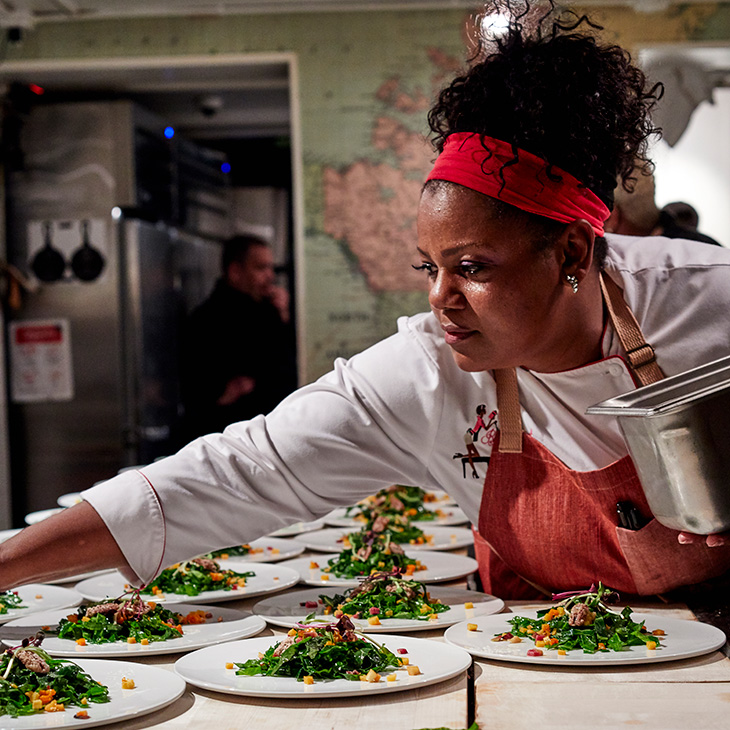
Jennifer Hill Booker knows this. Almost three decades into her career as a world-class chef, instructor and author, Booker understands the important role food has had for people and culture throughout history.
Booker grew up watching Julia Child on TV and quickly became infatuated with French cuisine. She even took French language classes in school. Her family moved to Tulsa when she was a teenager and she graduated from Booker T. Washington High School and following that, the University of Tulsa.
Knowing she wanted to be a chef, the recently married 20-something enrolled in culinary school at OSUIT.
Back then, it was known as OSU-Okmulgee. Booker remembers it as the place that taught her everything she needed to know about running a kitchen.
“I called it soup to nuts,” Booker said. “Our knife skills, our sauces and stock. Of course, you learned salads. We had ice carving, we learned how to make sushi and baking and pastry, American cuisine, French cuisine. We did everything.”
Booker earned an associate degree in occupational science from OSUIT in 1995.
After an externship in Hot Springs, Virginia, Booker moved to Germany with her husband, who was in the military. She cooked for members of the German community who lived around the military bases, preparing them American cuisine like fried chicken with gravy or string beans with bacon and onions. In the U.S., it was typical Southern homestyle cooking, but in Germany, it was a delicacy.
After a few years in Germany, Booker applied to Le Cordon Bleu in Paris, the pinnacle of French culinary institutions.
It was extremely rigorous, but the foundation Booker had built at OSUIT (and her background in French) paid off. She went on to graduate at the top of her class as one of only two American women to finish that year.
Booker was ready to start her own restaurant, but life had other plans. She had two daughters, moved back to the states and eventually settled in Georgia. She got back into the cooking business a few years later, becoming an instructor at the Le Cordon Bleu branch in Atlanta. Along with that, she expanded her portfolio by opening a catering business, restaurants and writing two cookbooks: Field Peas to Foie Gras: Southern Recipes with a French Accent and Dinner Déjà Vu: Southern Tonight, French Tomorrow.
It is a busy slate for Booker, who is currently overseeing her newest venture: Bauhaus Biergarten in Springdale, Arkansas, but she enjoys it. Despite all her success, she still thinks about her training at OSUIT. In 2019, she established the Jennifer Hill Booker Culinary Arts Scholarship for students in the culinary arts program to help students in the same position she was in 30 years ago.
“For me, as an educator, teaching someone cooking is absolutely a life skill,” said Booker, who is also a fellow on the James Beard Foundation. “I know that no matter what, they can cook a hot meal for themselves and for their family. And that’s empowering. If you can do that for yourself, then you already are building a sense of pride, you started your day out right.”
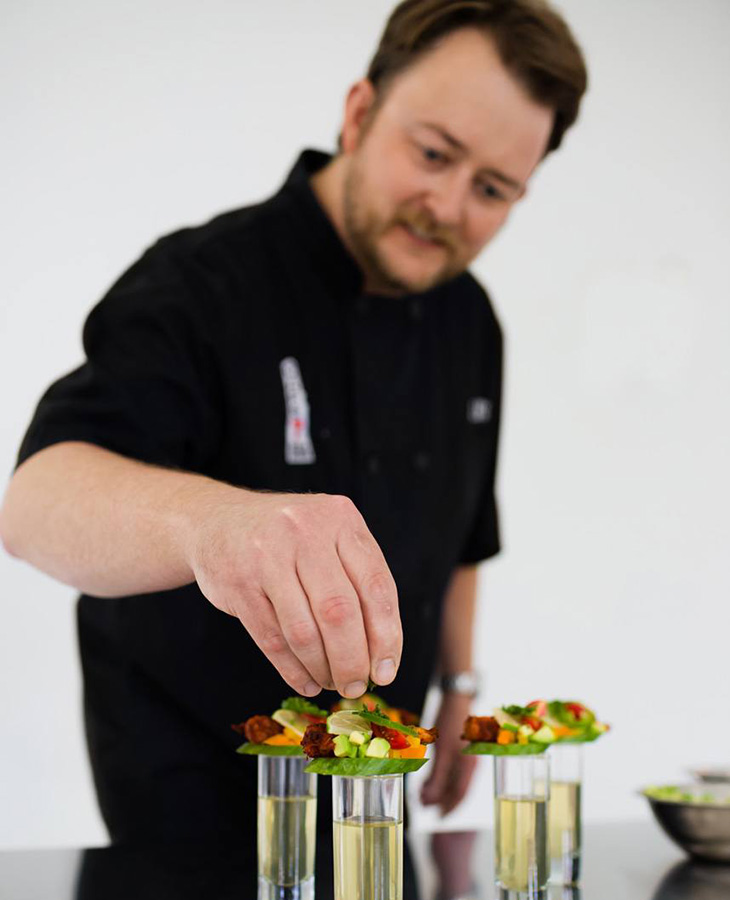
THE CONCEPT
J. Mays didn’t need to go to OSU to learn how to cook. He grew up in his family restaurant, Bill’s Fish House in Waurika, Oklahoma, opened by his great-grandparents. There, he got his culinary chops, but in HTM, he learned how to make a living with them.
Mays initially attended OSU as a finance major but quickly changed course. In the HRAD program, he and friend Chris Kana hit it off and planted the seeds for what would blossom into a thriving company — Killer Squid Hospitality, with the name coming from the initials K.S., the same as their fraternity, Kappa Sigma.
Mays and Kana came up with the idea of their first concept in a capstone class: Cafe 7, a fast-casual Italian restaurant inspired by how Chipotle had revolutionized the industry in the mid-2000s.
Mays graduated in 2005, with Cafe 7 opening in 2008. Its success propelled Mays to open other concepts: The Hamilton, an upscale dining experience; and most recently, Dado’s Pizza, a Harlem-inspired concept.
Having three successful concepts isn’t a fluke, and Mays credits OSU with preparing him to innovate and compete.
“A lot of people don’t see hospitality as a career. They see it more as a stepping stone to a career. In my opinion, hospitality is one of the greatest careers,” said Mays, who is also a partner in several Tulsa restaurants. “Yes, you do have some challenging people that you have to deal with. But it’s one of the most rewarding experiences you could do for a career. From that perfect guest experience down to the perfect bite, down to the perfect drink in the perfect evening in the perfect setting. That’s really what we wanted our hospitality crew to reflect was that moment where you just know everything is right. And it just hits you.”
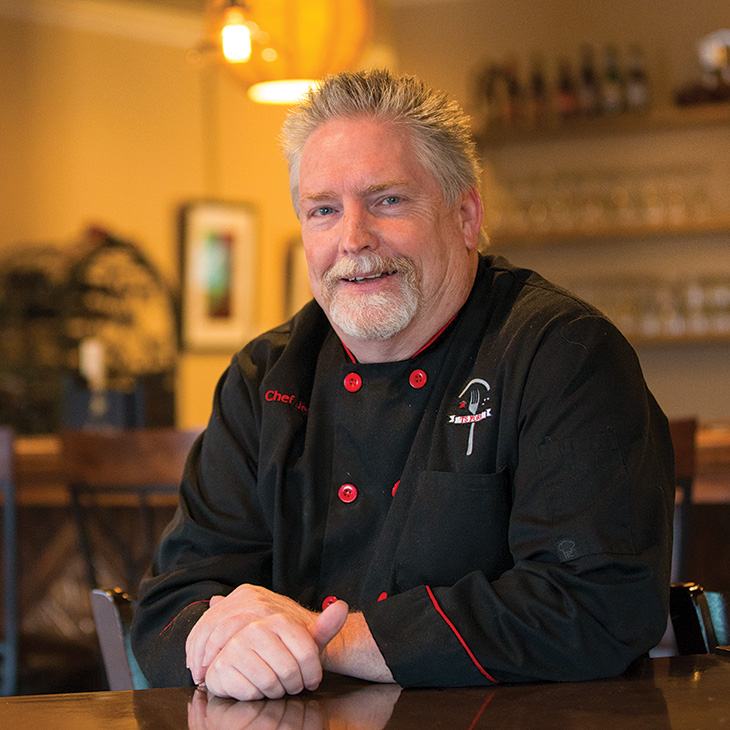
Jeff Denton knows what it takes to keep a restaurant fresh. Denton, affectionately known as Chef Jeff, has been in the kitchen for almost all his life. A 1982 HRAD graduate, Denton remembers having to take beverage education classes at the Holiday Inn off campus and notes how far the program has come since then.
A native of Ponca City, Oklahoma, Denton has been director of child nutrition at Ponca City schools for more than 30 years. He estimates he has supervised over 37 million meals in his time there.
Outside of the cafeteria, Denton is an author, former TV host and has a restaurant concept, TS Fork, in Tonkawa, Oklahoma, that he has made a name for itself over the past decade. In a 105-year-old building, TS Fork is open two nights a week with a made-from-scratch menu that changes every couple of weeks. It gives Denton time to experiment and the people of north central Oklahoma world-class cuisine.
Denton credits his years of success to his time at OSU.
“I felt like when I was there, I got a very rounded perspective on the business itself,” Denton said. “That set me up to get interviews with companies that I worked at that would normally not hire me. So I think that was critical. I wouldn’t trade my experience at OSU for absolutely anything. And that’s why I bleed orange deep down. That’s why my kids went there.”
THE FUTURE
Manny Neundorf wants to use his HTM degree to see the world, and he plans on making that dream come true.
Neundorf, a junior from Edmond, Oklahoma, was adopted. He hopes to someday work in the resort industry in Mexico and build a deeper connection with his own cultural heritage. But first, he wants to complete his degree. Despite having worked in kitchens throughout
“Food is a common denominator in everything that defines hospitality. It’s the great equalizer. Food is really the window to the soul of a culture.”
Edmond as a teenager, Neundorf wanted a degree so he could one day manage the restaurant, not just work in it. At OSU, he has learned accounting, health and food safety, and restaurant operations.
He currently works at Planet Orange, another student-run restaurant on OSU’s campus, and is using the skills he is learning there to prepare for his career. He credits HTM’s unique curriculum with making sure he is ready for whatever comes.
“At some point, I will be expected to run the restaurant. And if I really want to do that, I have to be capable,” Neundorf said. “So I’ve really used this job as sort of a way to experiment, a way to learn things, a way to grow. And I’ve had a lot of growing moments.
“I’ve really tried to take full advantage of that job. And they’ve given me room to fail, which I really appreciate because not a lot of jobs have done that.”
Thapa said allowing room to experiment and learn is what empowers graduates to succeed. The restaurant business is competitive, but OSU graduates have the edge.
“At OSU, we encourage our students to dream big,” he said. “But the dream is just the beginning. We show them how to make those dreams into reality and share their passion with the world.”
Photos By: Gary Lawson, Phil Shockley and Provided
Story By: Jordan Bishop | STATE Magazine
